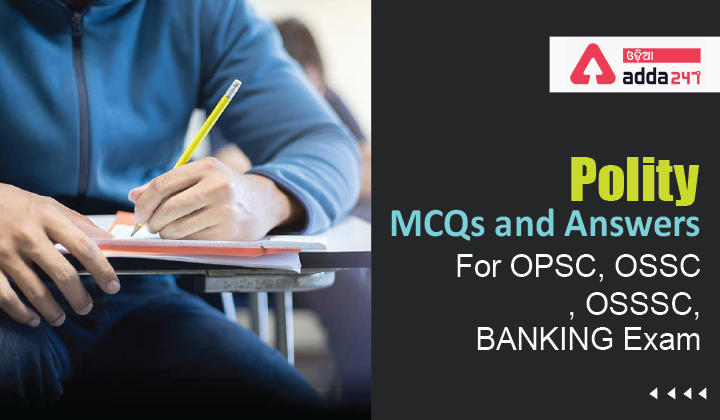Polity MCQs and Answers: Polity MCQs are very important for OPSC, OSSC, OSSSC & Other State Exams. Aspirants who are willing to apply for the various Government exams in 2022 must go through the topics of Polity for competitive exams, as Polity is a key part of the syllabus.
Download ADDA247 Odia APP – Appear Latest Exam Test Series & Live Classes
Q1. The Constituent Assembly declared its solemn pledge to make India_______
- Sovereign, Democratic Republic
- Sovereign, Democratic, Secular Republic
- Sovereign, Socialist Secular, Democratic Republic
- No such declaration was made by the Constituent Assembly
S1. Ans.(a)
Sol. The original Preamble, adopted by the Constituent Assembly in 1949, declared India a “Sovereign Democratic Republic”.
By the 42nd Amendment of 1976, the words “Socialist” and “Secular” were inserted; the Preamble now reads “Sovereign Socialist Secular Democratic Republic”.
Q2. ______________ is the current Chief Minister of Sikkim (27 May 2019 – present).
(a)Prem Singh Tamang
(b)Pawan Kumar Chamling
(c)SanchamanLimboo
(d)Nar Bahadur Bhandari
S2. Ans.(a)
Sol. Prem Singh Tamang is the current Chief Minister of Sikkim (27 May 2019 – present).
Q3. Which of the following was constituted under the Panchayati Raj System?
(a) Khap Panchayat
(b) Caste Panchayat
(c) Gram Panchayat
(d) Jan Panchayat
S3. Ans.(c)
Sol.Panchayati Raj generally refers to the system of local self-government in India. It was introduced by 73rd Constitutional Amendment in 1992. The system has three levels: Gram Panchayat (village level), Mandal Parishad or Block Samiti or Panchayat Samiti (block level) and ZilaParishad (district level).
Q4. Who is the executive head of the State Government?
(a)The Chief Minister
(b)The Governor
(c)The Secretary to the Chief Minister
(d)The Chief Secretary
S4. Ans.(b)
Sol. GOVERNOR: State executive consists of the Governor and Council of Ministers including the Chief Minister.
The Governor of a State is appointed by the President for a term of five years and holds office during his pleasure. Only Indian citizens above 35 years of age are eligible for appointment to this office. The executive power of the State is vested in Governor.
Council of Ministers with Chief Minister as head aids and advises Governor in the exercise of his functions except in so far as he is by or under the Constitution required to exercise his functions or any of them in his discretion.
In respect of Nagaland, Governor has special responsibility under Article 371 A of the Constitution with respect to law and order and even though it is necessary for him to consult the Council of Ministers in matters relating to law and order, he can exercise his individual judgment as to the action to be taken.
Q5. Who among the following is the first Lieutenant Governor of Ladakh?
(a)ThupstanCheewang
(b)KushokBakula Rinpoche
(c)R.K Mathur
(d)Janyang Tsering
S5. Ans.(c)
Sol. Ladakh became a Union Territory on 31st October 2019.
The present and first Lieutenant-Governor of Ladakh is R.K Mathur.
Earlier, he was the Chief Information Commissioner of Indiatill 2018.
He is also retired as India’s Defence Secretary.
Q6. Chief Minister of Delhi is appointed by
(a)Prime Minister
(b)Lieutenant Governor
(c)President
(d)Parliament
S6. Ans.(c)
Sol. On the advice of Lieutenant Governor, the president of India appoints the chief minister of Delhi.
Govt. of India, city or local governments are as per 74th Constitutional Amendment Act in UTs.
Delhi is a Union territory and Union Territories are governed by the Central Government.
Delhi, Puducherry, Jammu & Kashmir are UTs with Legislative Assembly in India.

Q7. All the disputes in connection with the election of President or Vice President shall be decided by (a) Supreme Court
(b) Election Commission
(c) High Courts
(d) Speaker of the Lok Sabha
S7. Ans.(a)
Sol.According to the Article 71 of the Indian Constitution, All the disputes in connection with the election of President or Vice President shall be decided by Supreme Court of India.
Q8. Who among the following is the Chief Minister of Rajasthan as of March 2021?
(a)Naveen Patnaik
(b)Ashok Gehlot
(c)Biplab Kumar Deb
(d)Trivendra Singh Rawat
S8. Ans.(b)
Sol. Ashok Gehlot has become the Chief Minister of Rajasthan for the third time.
Before this, Gehlot became the Chief Minister for the first time in 1998 and for the second time in 2008.
He is the fourth leader to become the Chief Minister for the third time in the state.
Prior to Gehlot, Bhairon Singh Shekhawat and Haridev Joshi were the Chief Ministers three times. Although Mohan Lal Sukhadia held this post the most four times.
Q9. Who has been appointed as the governor of Meghalaya in August 2020?
(a)R.N. Ravi
(b)Acharya Devvrat
(c)S. Narayan Arya
(d)Satya Pal Malik
S9. Ans.(d)
Sol. Satya Pal Malik appointed as the governor of Meghalaya in August 2020.
Satya Pal Malik is an Indian politician serving as the 21st and current Governor of Meghalaya.
Satya Pal Malik was appointed as Governor of Meghalaya by Hon’ble President Shri Ram NathKovind on the 18th of August 2020.
Q10. Who was the chairman of the committee formed for reviewing the Panchayati Raj in 1977?
(a) Balwantrai Mehta
(b) Ashok Mehta
(c) G.B. Pant
(d)Jagjivan Ram
S10. Ans.(b)
Sol. In December 1977, the Janata Government appointed a committee on Panchayati Raj institutions under the chairmanship of Ashoka Mehta.
Q11. As of August 2020, which of the following pairs is correct with reference to the administration of the Union Territories of India?
(a)Ladakh – Anil Baijal
(b)Andaman and Nicobar Island – Dineshwar Sharma
(c)Delhi (NCT) – Praful Patel
(d)Jammu and Kashmir – Manoj Sinha
S11. Ans.(d)
Sol. The correct answer is option 4.
Union Territories are ruled directly by the Central Government.
Union Territories has a Lieutenant Governor as an administrator.
Lieutenant Governor is the representative of the President of India and appointed by the President on the recommendation of the Prime Minister.
Union Territories have no representation in the Rajya Sabha except Delhi and Puducherry.
There are 8 Union Territories in India.
Q12. Chief Election Commissioner of India holds office for a period of
- Six years
- During the pleasure of the President
- For six years or till the age of 65 years, whichever is earlier
- For five years or till the age of 60 years, whichever is earlier
S12. Ans.(c)
Sol. Chief Election Commissioner of India holds office for a period of for six years or till the age of 65 years,whichever is earlier.
Rajiv kumar is the current and 25th Chief Election Commissioner of India.
Q13. Which one of the following Articles deals with the appointment of the Governor of a State in India?
(a)Article 125
(b)Article 135
(c)Article 155
(d)None of the above
S13. Ans.(c)
Sol. Part VI of the Constitution deals with the government in the states.
Articles 152 to 167 in part VI of the constitution deal with the state executives.
The state executive consists of the governor, the chief minister, the council of ministers and the advocate general of the state.
There shall be a Governor for each state (Articles 153 of the Constitution of India).
The executive power of the State shall be vested in the Governor and shall be exercised by him either directly or through officers subordinate to him in accordance with the Constitution of India (Article 154).
The Governor of a State shall be appointed by the President by warrant under his hand and seal (Article 155).
Q14. Which of the following statements is not correct about the Chief Minister?
(a)The Council of Ministers shall be collectively responsible to the Legislative Assembly of the State.
(b)Article 154 states that the Governor will appoint the Chief Minister.
(c)The Governor is free to appoint any person as Chief Minister.
(d)A Minister who for any period of six consecutive months is not a member of the Legislature of the State shall at the expiration of that period cease to be a Minister.
S14. Ans.(b)
Sol. Article 161 states that there would be a Chief Minister of the state appointed by the Governor.
Q15. Shivraj Singh Chouhan is the current Chief Minister (23 March 2020 – present) of which Indian state?
(a)Chhattisgarh
(b)Maharashtra
(c)Madhya Pradesh
(d)Kerala
S15. Ans.(c)
Sol. Shivraj Singh Chouhan is the current Chief Minister (23 March 2020 – present) of Madhya Pradesh.








